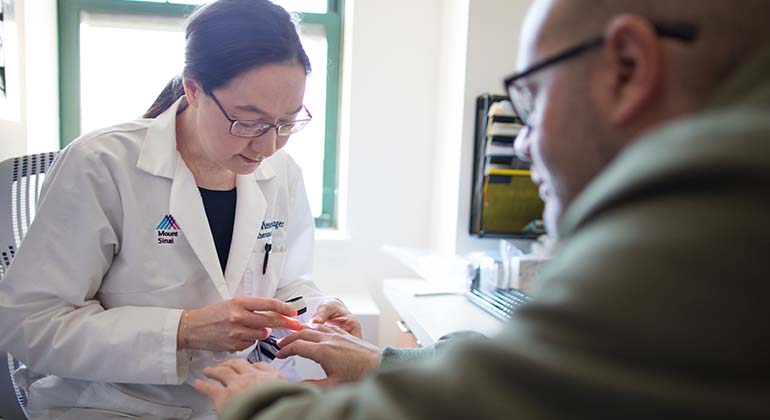Scleroderma

A rare condition, scleroderma is an autoimmune disease that affects the skin, and may affect blood vessels and internal organs. Scleroderma is a chronic condition that may get worse over time. For this reason, it is important to seek a rheumatology consultation as soon as the diagnosis is suspected.
Often the first sign of scleroderma is detected in the fingers. Upon exposure to cold or stress the fingers may change color to a pale or bluish tone. This may be accompanied by pain and a tingly feeling. This condition, called Raynaud’s phenomenon, can occur on its own; but it is often associated with scleroderma.
In addition, scleroderma causes shiny, hard, tight patches of skin. These often appear on the trunk or on the fingers, face, and toes. These changes of the skin make everyday movements difficult, such as extending the fingers, difficult.
There are two basic types of scleroderma:
- Localized sclerosis causes one or more patches of hard skin and rarely spreads beyond these places. Usually, it is relatively mild. There are two types of localized scleroderma: Morphea affects people between ages 20 and 50. Linear scleroderma tends to form a line of hardened skin and usually begins in childhood.
- Systemic scleroderma affects tissues all over the body. It may include the stomach, bowels, lungs, kidneys, heart, blood vessels, muscles, and joints. There are two types of systemic scleroderma.
The evaluation of a patient with suspected scleroderma patient will include the complete history and physical examination, blood and urine tests as well as imaging tests as needed.
Treatments We Offer
Scleroderma affects many body systems. So, in addition to your rheumatologist, it is important to have a multidisciplinary team of experts, including cardiologists, pulmonologists, nephrologists, dermatologists, gastroenterologists, and imaging experts.
Why Mount Sinai
Mount Sinai has a large network of hospitals and medical offices. We have many highly trained and experienced specialists, which is very important with a multi-faceted disease like scleroderma. Your Mount Sinai rheumatologist can help you with a diverse medical team. We ensure that you get the best possible state-of-the-art care.